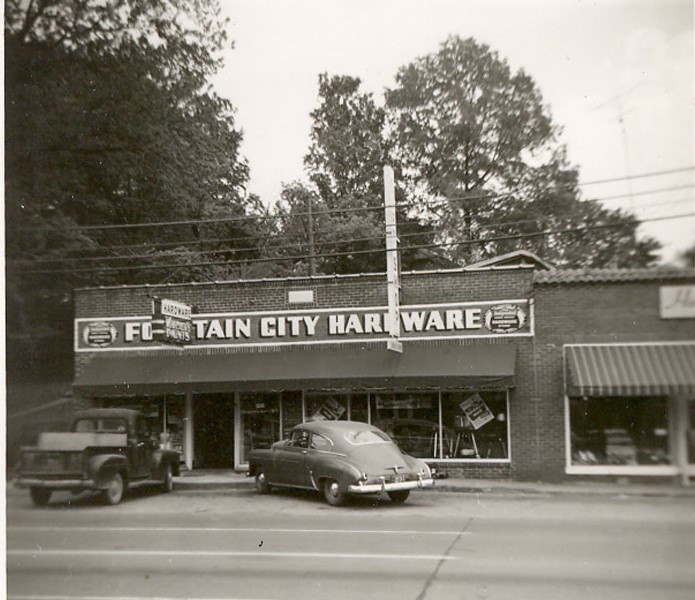Cliff White founded and managed the Fountain City Hardware in the 5300 block of Broadway across from “The Station.” He sold the store to John T. Roos in 1949. Cliff was married to Edith Gray (1905-2000) who became owner and manager of another Fountain City landmark, the Village Vendors.
Raymond Clifford “Cliff” White, born on June 5, 1892, was the son of Frank A. White (1854-1937) and Angeline Murphy White (1863-1941). Cliff was raised on his parents’ farm in the Hendron’s Chapel community of Knox County near the Sevier County line, the seventh of the nine children who lived to adulthood.

Edith Gray White and R. Cliff White. Active in the community and long-time owner of Fountain City Hardware Store, Cliff White was Knox County register of deeds for two terms (1950-1958). (Courtesy of St. Paul Methodist Church)
Cliff had barely completed his education in the local schools and begun his working career when World War I, one of the deadliest conflicts in history, began in Europe in July 1914.
President Woodrow Wilson felt the U.S. must join the Allies in the war effort after seven U.S. merchant ships were sunk by submarines. He called for a declaration of war and the U.S. Congress declared war on April 6, 1917.
The U.S. eventually drafted 2.8 million men and, by the last two years of the war, 10,000 American soldiers were reaching France each day. Among them were Cliff White and the other members of the 105th Trench Mortar Battery, raised locally and attached to Gen. Cary Spence’s 30th Infantry Division.
Capt. Ambrose Gaines was the driving force in the recruitment and organization of the unit between July and September 1916, when the U.S. entry into the war seemed imminent. Under the command of Capt. Thomas F. Hazen Jr., they were first sent to Texas for border patrol early in 1917, but soon returned to Knoxville. Although the average age of the 183 soldiers was only 18 years, their commander later called them the “fighting fools” and said, “The rougher it went, the better they liked it.”
The 105th Battery was called to state service July 25, 1917, and then to federal service August 5, 1917. After extensive training at Camp Sevier near Greenville, S.C., the unit boarded ship and docked at LeHarve, France, on June 14, 1918, and was assigned to the Western Front at Monol la Tour on Aug. 24, 1918.
Gen. John Pershing’s American Expeditionary Force (AEF) conducted some of its first operations upon arriving in France in the St. Mihiel Offensive (Sept. 9-17, 1918). The Germans had established the St. Mihiel salient which seriously interrupted French rail communications between Paris and the eastern segments of the front in the fall of 1914. To continue the drive toward the Hindenburg Line at the border of Germany, Pershing needed to relieve that major obstacle.
The 105th Trench Mortar Battery engaged in their first combat at St. Mihiel on Sept. 17 at 2:30 a.m. when they fired about 1,000 rounds at enemy troops. When the battle ended, Pershing’s Army had taken 15,000 prisoners and captured 257 guns at a cost of about 7,000 casualties. They moved on to the Argonne Forest.
Following the Argonne Battle, the 105th replaced the 101st Trench Mortar Battery and held their position until Nov. 15, 1918, four days after the armistice. The 105th arrived back in the United States March 3, 1919, aboard the Battleship Michigan on her last voyage and moved from Newport News, Virginia, to Fort Oglethorpe, Georgia, where the group was demobilized four days later.
Many years later, on 50th anniversary of Armistice Day (1968), members of the 105th would meet to reminisce about their service in the “War to End All Wars.” Those present were: R. Cliff White; Earl Dawson, plant manager of Ideal Cleaners; Harry W. Carr, an employee of Knoxville Utilities Board; Frank “Pete” Lockett, president of the now defunct Jefferson Woolen Mills; and Frank Stansberry, former manager of John Tarleton Institute.
Upon his return from the war, White founded and managed the Fountain City Hardware until he sold it to John T. Roos in 1949. A pillar of his community, White was elected Knox County register of deeds in 1950 and served two terms (1950-1958). He was a charter member of the Fountain City Lions Club and received an honorary lifetime membership. Also a longtime member of the Fountain City Park Commission, he was its president for a time. He was a member of St. Paul Methodist Church.
Cliff White, 82, passed away on Dec. 26, 1974, at the University Hospital after a brief battle with cancer. He was survived by his wife, Edith Gray White, and two daughters, Doris (David) Dodson of Paducah, Kentucky, and Mary Ann (Donald) Connors of Harvard, Massachusetts. After services at Gentry Mortuary, he was buried in Lynnhurst Cemetery.
Jim Tumblin, retired optometrist and active historian, writes a monthly series called “Fountain City: Places That Made a Difference” for KnoxTNToday.com.



